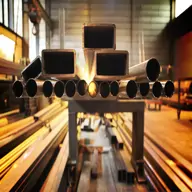Engineering Materials - Material Classification

Language
English
1923 Views
14 Enrollments
Share
Coming in February, 2025
-
-
This course format is where trainer will explain you the subject via online live session. Date and time are not decided yet but it will be planned within next 2 weeks after you enroll & pay for this course. Get in touch with our team if any clarification is required.
₹ 499
online

₹ 499
Why do you enroll
Key topics covered
Course details
Course tags
Why do you enroll
Mastering the classification of engineering materials can significantly enhance your career prospects in various fields, including aerospace, automotive, construction, and manufacturing. By understanding the properties and applications of different materials, you can move into specialized roles such as Materials Engineer, Research and Development Engineer, or Quality Control Manager. Additionally, this expertise can lead to leadership positions like Senior Design Engineer or Technical Director, where you'll oversee material selection and development for innovative projects. Stay ahead in the industry by deepening your knowledge of material classification and unlock new opportunities for career growth and advancement.
Show more
Key topics covered
Properties of different materials,
Classification of Materials,
Material Selection,Metals,
Non-metals,Ferrous and Non ferrous Materials,
Materials Commonly used
Show more
Course Details
The major classifications of engineering materials include metals, polymers, ceramics, and composites. The important characteristics of the materials within each of these classes are discussed in this course, and use of material properties are also explained. Engineering design materials to meet required properties to design an equipment & materials science plays an important role to understand the fundamental factors that influence the structure and properties of a material. such as thermodynamics, structural evolution, etc. This course is designed to provide in depth knowledge on these material and it's material properties.
You will learn various parameters after completing this course -
1. What are different materials
2. How to select material for different industrial applications
3. Theoretical background behind each requirements which helps an engineer to understand the importance and necessity of material requirements at different stages.
4. An insight into the newly introduced material, it's criteria and guidelines.
5. Bridging the gap between theoretical knowledge and practical application requirements.
6. University students who want to take up career in engineering or manufacturing department and wants to learn about the most widely used best practices and standard.
7. Experienced engineers who want to grow their career in engineering or production by understand the background of different types requirements

Show more
Course tags
Industry domains :
Engineering Disciplines :
FAQs on Engineering Materials - Material Classification
Having specific question ? Ask now
Trainer’s Feedback
5 course rating
1 ratings
mg
mani giri
2 months ago
Very useful for me I'm inthe welding inspection filed so very useful full notes and tips I get through this and learning also lot
Certificate of Mastery

Receive well recognised certificate that you can showcase on
Featured courses
Hazard Identification and Risk Assessmen...

How to prevent corrosion in the oil and ...

Application and use of "Green Hydrogen"

Career in EPC projects for Freshers

Career in EPC Cost Estimation

Learn MATLAB Programming

More Technical Courses From Chaitanya Purohit
Mastering Project Management: Delivering...

Mastering Supply Chain Management: Optim...

Mastering Six Sigma: Driving Quality and...

Kaizen: The Art of Continuous Improvemen...

Welding Technology - Basics

Engineering Materials - Material Manufac...

Engineering Materials - Iron & Steel mak...

Engineering Materials - Material Classif...

Similar Content Learn:
ASPEN HYSYS

ASPEN PLUS

Solar Rooftop Power Plant Installation P...

MS Excel Basic Training Course for Begin...

Basic of CMS IntelliCAD and GD&T

Fundamentals of Quality, QMS & ISO-9001

Business Excellence through Quality, QMS...

Similar Content Mentor:
All About Interviews

Presentation Skills _ Part 3

Presentation Skills _ Part 2

Similar Content Seminar:
The Petrochemical and Refining Congress:...

7th International Oil & Gas Chemistry, C...

Similar Content Blogs:
Engineering Materials

The Importance of Steel in Construction

Aerodynamic physics of the Delta Wing

Seal of Hydraulic cylinder.

PRC Europe 2025: Italian Partners at the...

Similar Content Community:
Firefighting Design By Naga

Engineer's Corner

Cathodic protection

Corrosion

Cae engineers

Similar Profile:

Vijay Sachdev
Consultant - Project & Pr...

Debojyoti sen
MD & CEO, SAURYAJYOTI REN...

Sabari Kuppuraj
Engineer

Atul Kabre
Independent Consultant

Anup Kumar Dey
Owner of https://whatispi...

Jyoti Swarup
--

Praveen Tiwari
--

Please wait





































